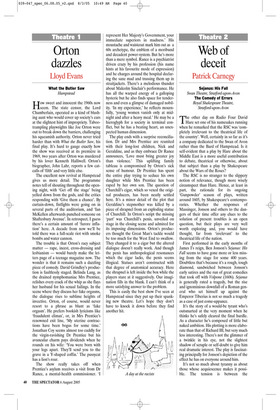Orton dazzles
Lloyd Evans
What the Butler Saw Hampstead How sweet and innocent the 1960s now seem. The state censor, the Lord Chamberlain, operated as a kind of blushing aunt who would cover up society’s ears at the slightest hint of impropriety. Tabootrampling playwrights like Joe Orton were out to break down the barriers, challenging his squeamish authority. Orton never tried harder than with What the Butler Saw, his final play. It’s hard to gauge exactly how the show was received at its première in 1969, two years after Orton was murdered by his lover Kenneth Halliwell. Orton’s biographer, John Lahr, reports a few catcalls of ‘filth’ and very little else.
The excellent new revival at Hampstead gives us more detail. The programme notes tell of shouting throughout the opening night, with ‘Get off the stage’ being yelled down from the gods, and the critics responding with ‘Give them a chance’. By curtain-down, fistfights were going on in several parts of the auditorium, and ‘Ian McKellen afterwards punched someone on Shaftesbury Avenue’. In retrospect, I guess there’s a certain amount of ‘furore inflation’ here. A decade from now we’ll be told there was a full-scale riot with smoke bombs and water cannon.
The trouble is that Orton’s racy subject matter — rape, incest, cross-dressing and lesbianism — would barely make the letters page of a teenage magazine now. The wonder is that it remains such a dazzling piece of comedy. David Grindley’s production is faultlessly staged. Belinda Lang, as the drained nymphomaniac Mrs Prentice, relishes every crack of the whip as she flays her husband for his sexual failings. In the scene where they discuss her fake orgasms, the dialogue rises to sublime heights of invective. Orton, of course, would never resort to a phrase as blunt as ‘fake orgasm’. He prefers bookish lyricisms like ‘fraudulent climax’, or, in Mrs Prentice’s renowned exit line, ‘My uterine contractions have been bogus for some time.’ Jonathan Coy seems almost too cuddly for the virgin-ravishing Dr Prentice but his avuncular charm pays dividends when he rounds on his wife: ‘You were born with your legs apart. They’ll send you to the grave in a Y-shaped coffin.’ The pussycat has a lion’s roar.
The show really takes off when Prentice’s asylum receives a visit from Dr Rance, a mental-health commissioner. ‘I represent Her Majesty’s Government, your immediate superiors in madness.’ His moustache and waistcoat mark him out as a 60s archetype, the emblem of a moribund and decadent power-system. But he’s more than a mere symbol. Rance is a psychiatrist driven crazy by his profession (his name hints at his favourite mode of expression) and he charges around the hospital declaring the sane mad and trussing them up in straitjackets. There’s a melodious thunder about Malcolm Sinclair’s performance. He has all the warped energy of a galloping hysteric but he also finds space for tenderness and even a glimpse of damaged nobility. ‘In my experience,’ he reflects mournfully, ‘young women vanish only at midnight and after a heavy meal.’ He may be a hieroglyph for a society in terminal conflict, but he has a beating heart, an unexpected human dimension.
The play ends with a surprise reconciliation. Dr and Mrs Prentice are reunited with their long-lost children, Nick and Geraldine, and as they embrace Dr Rance announces, ‘Love must bring greater joy than violence.’ This uplifting family tableau is compromised by Orton’s sick sense of humour. Dr Prentice has spent the entire play trying to seduce his own daughter while Mrs Prentice has been raped by her own son. The question of Churchill’s cigar, which so vexed the original producers, has been neatly settled here. It’s a minor detail of the plot that Geraldine’s stepmother was killed by a piece of shrapnel from an exploding statue of Churchill. In Orton’s script the missing ‘part’ was Churchill’s penis, unveiled on stage in the closing scene and admired for its imposing dimensions. Orton’s producers thought the Great Man’s tackle would be too much for the West End to swallow. They changed it to a cigar but the altered dialogue doesn’t really work. And though the penis has anthropological resonances which the cigar lacks, the penis seems illogical. Statues aren’t constructed with that degree of anatomical accuracy. Here the shrapnel is left inside the box while the players stare at it suggestively. Our imagination fills in the blank. I can’t think of a more satisfying answer to the problem.
This is easily the best show I’ve seen at Hampstead since they put up their spanking new theatre. Let’s hope they don’t have to knock it down before they find another hit.











































 Previous page
Previous page